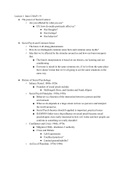Class notes
PSY220: Intro to Social Psychology - University of Toronto - All Lecture Notes
- Course
- Psy220 (PSY220)
- Institution
- University Of Toronto (U Of T )
PSY220: INTRO TO SOCIAL PSYCHOLOGY LECTURE NOTES ALL LECTURES PROF: WILL HUGGON SUMMER SESSION 2020
[Show more]



